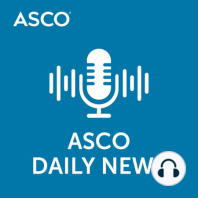15 min listen
Therapeutic Advances in Multiple Myeloma Featured at #ASCO21
FromASCO Daily News
ratings:
Length:
28 minutes
Released:
Jun 24, 2021
Format:
Podcast episode
Description
Dr. Mitul Gandhi, medical oncologist-hematologist at Virginia Cancer Specialists of the US Oncology Network, highlights therapeutic advances in multiple myeloma featured at the 2021 ASCO Annual Meeting. Transcript: ASCO Daily News: Welcome to the ASCO Daily News Podcast. I'm Geraldine Carroll, a reporter for the ASCO Daily News. My guest today is Dr. Mitul Gandhi, a medical oncologist specializing in hematologic malignancies at Virginia Cancer Specialists, which is part of the US Oncology Network. Dr. Gandhi will discuss therapeutic advances in multiple myeloma featured at the 2021 ASCO Annual Meeting. He reports no conflicts of interest relating to our discussion today, and full disclosures relating to all episodes of the podcast are available on our transcripts at asco.org/podcasts. Dr. Gandhi, welcome to the ASCO Daily News podcast. Dr. Mitul Gandhi: Thank you for having me. ASCO Daily News: Let's first look at the OPTIMUM MUKnine trial. It's Abstract 8001. And it reported high overall response rates in patients with ultra high-risk multiple myeloma with Dara-CVRd induction therapy. What are your takeaways from this study, Dr. Gandhi? Dr. Mitul Gandhi: Sure. So, the OPTIMUM study was conducted by the UK group, and it's noteworthy for several reasons. The way they had constructed the trial, they designed and developed a platform primarily to enrich for a predefined subset of very high-risk individuals, whether it was through a set of genetic assessment or with central gene expression profiling. And the way the trial was conducted, while patients were waiting to ascertain the results of the gene expression profiling (GEP) they could receive two cycles of bridging therapy. Once those results were furnished or they met the cytogenetic risk criteria, patients who subsequently consented to the intervention protocol which was a dose intensified regimen, five drug regimen, incorporating daratumumab, cyclophosphamide, bortezomib, lenalidomide, and dexamethasone. So, patients would receive induction for up to six cycles, and that would include the two cycles of potential bridging therapy as GEP was being evaluated on an every 21 day basis. And then this was followed by a modified conditioning regimen consisting of high-dose melphalan at 200 milligrams per meter squared along with weekly bortezomib which was continued even following autologous stem cell rescue, really until count recovery. Subsequently, patients received an additional six cycles of daratumumab, bortezomib, revlimid, or lenalidomide followed by 12 cycles of daratumumab and rituximab until progression. This was a complex study design with an intensified induction consolidation and maintenance phase, but it did yield a impressively high OR rate, or overall response rate, at 94% with very good partial response or greater seen in 77% after assessment following autologous transplantation, including 46% complete response (CR). And of those with CR, they had identified 63% achieving MRD negativity as well. And I think the authors should be commended for one, enriching a high-risk subset of patients both on conventional cytogenetics and/or GDP, and then two, utilizing the most active agents that we currently have to elicit high responses and then to consolidate on those following transplant. I think some of the take homes from the study are the ability to demonstrate feasibility of central genomic risk stratification related to more precisely identify and select high-risk patients as this is kind of an area of unmet need of where to augment therapy appropriately. I think it's still a question whether or not this is the exact dose intensified regimen that's going to elicit the best long-term outcomes in these highest risk patients and whether or not the conventional surrogates for a long-term progression-free survival (PFS) benefits such as MRD really apply to this as there is some controversy regarding that. Nonetheless, I think this offers a kind of a reproducible platform
Released:
Jun 24, 2021
Format:
Podcast episode
Titles in the series (100)
Dr. Karim Fizazi on the PEACE-1 Trial & Improving Outcomes in mCSPC: Dr. Karim Fizazi, medical oncologist at Gustave Roussy and professor in Oncology at the University of Paris-Saclay in France, tells guest host, Neeraj Agarwal, editor-in-chief of ASCO Daily News and director of the Genitourinary Cancers Programs at... by ASCO Daily News
